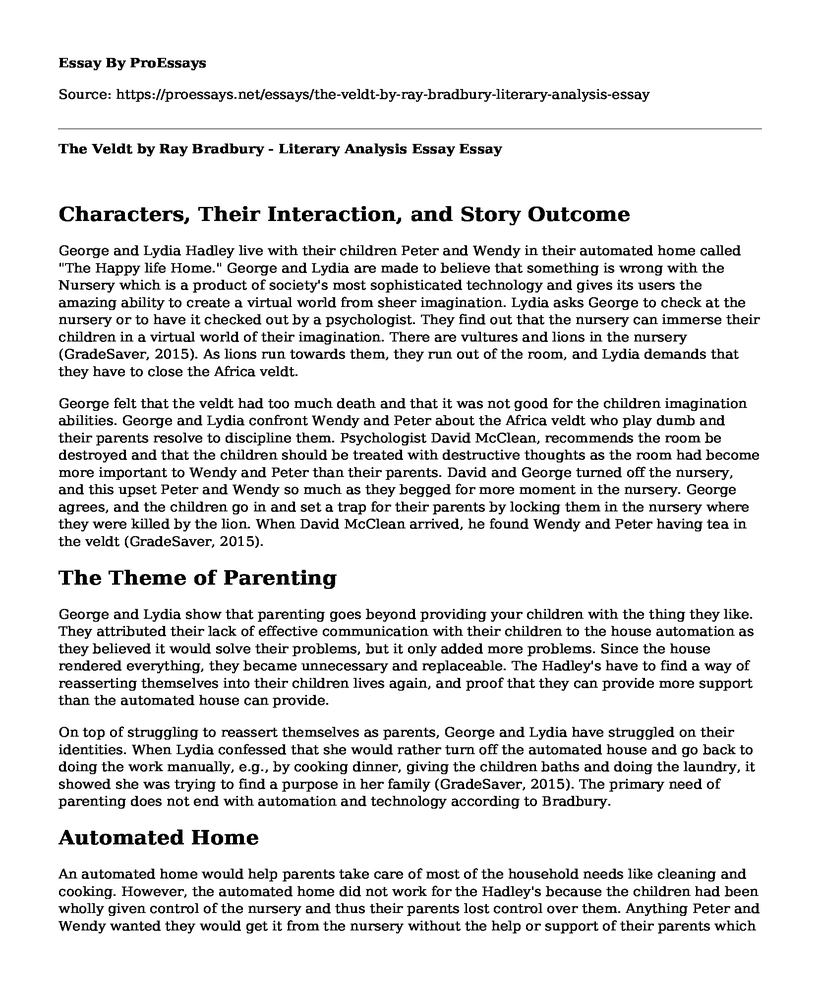Characters, Their Interaction, and Story Outcome
George and Lydia Hadley live with their children Peter and Wendy in their automated home called "The Happy life Home." George and Lydia are made to believe that something is wrong with the Nursery which is a product of society's most sophisticated technology and gives its users the amazing ability to create a virtual world from sheer imagination. Lydia asks George to check at the nursery or to have it checked out by a psychologist. They find out that the nursery can immerse their children in a virtual world of their imagination. There are vultures and lions in the nursery (GradeSaver, 2015). As lions run towards them, they run out of the room, and Lydia demands that they have to close the Africa veldt.
George felt that the veldt had too much death and that it was not good for the children imagination abilities. George and Lydia confront Wendy and Peter about the Africa veldt who play dumb and their parents resolve to discipline them. Psychologist David McClean, recommends the room be destroyed and that the children should be treated with destructive thoughts as the room had become more important to Wendy and Peter than their parents. David and George turned off the nursery, and this upset Peter and Wendy so much as they begged for more moment in the nursery. George agrees, and the children go in and set a trap for their parents by locking them in the nursery where they were killed by the lion. When David McClean arrived, he found Wendy and Peter having tea in the veldt (GradeSaver, 2015).
The Theme of Parenting
George and Lydia show that parenting goes beyond providing your children with the thing they like. They attributed their lack of effective communication with their children to the house automation as they believed it would solve their problems, but it only added more problems. Since the house rendered everything, they became unnecessary and replaceable. The Hadley's have to find a way of reasserting themselves into their children lives again, and proof that they can provide more support than the automated house can provide.
On top of struggling to reassert themselves as parents, George and Lydia have struggled on their identities. When Lydia confessed that she would rather turn off the automated house and go back to doing the work manually, e.g., by cooking dinner, giving the children baths and doing the laundry, it showed she was trying to find a purpose in her family (GradeSaver, 2015). The primary need of parenting does not end with automation and technology according to Bradbury.
Automated Home
An automated home would help parents take care of most of the household needs like cleaning and cooking. However, the automated home did not work for the Hadley's because the children had been wholly given control of the nursery and thus their parents lost control over them. Anything Peter and Wendy wanted they would get it from the nursery without the help or support of their parents which made both George and Lydia lose control (GradeSaver, 2015).
Video Versus the Story
In the video, one can visualize the automated home in a better manner than when one is reading the story. The music that plays in the video also helps to make the video capture the whole idea in a better way. The illusions in the story are shown better in the video than the book, and this helps one understand Bradbury's point about nature versus nurture. The loss of life of George and Lydia is better depicted in the video than reading the story.
References
GradeSaver. (2015, May 30). Ray Bradbury: Short Stories "The Veldt" Summary and Analysis. Retrieved from https://www.gradesaver.com/ray-bradbury-short-stories/study-guide/summary-the-veldt
The Veldt Summary - eNotes.com. (n.d.). Retrieved from https://www.enotes.com/topics/veldt
The Veldt Summary. (n.d.). Retrieved from https://www.shmoop.com/the-veldt/summary.html
Cite this page
The Veldt by Ray Bradbury - Literary Analysis Essay. (2022, May 22). Retrieved from https://proessays.net/essays/the-veldt-by-ray-bradbury-literary-analysis-essay
If you are the original author of this essay and no longer wish to have it published on the ProEssays website, please click below to request its removal:
- The Nose by Gogol Essay
- Holden on to Existentialism: Catcher in the Rye Essay
- Epic Poems Essay Example
- Essay Sample on Exploring Marxist Theory in William Shakespeare's Othello
- Essay Sample on Justine Moritz: Innocent Victim of Monster's Frame
- The Chimney Sweeper: William Blake's Poem of Innocence - Essay Sample
- Essay Example on Dracula: Patriarchal Society & Representation of Evil in Female Characters







